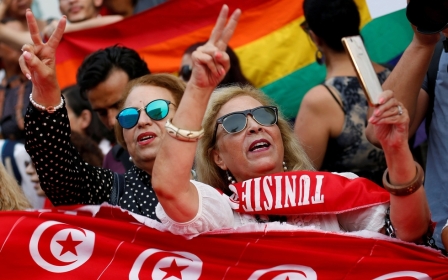Tunisia extends state of emergency for one month

Tunisia's presidency on Friday extended the country's state of emergency, imposed in 2015 after a series of deadly attacks.
The decision to prolong the state of emergency until 6 November comes amid a tense political climate ahead of legislative and presidential elections planned for next year.
President Beji Caid Essebsi made the decision after meeting the ministers of defence and interior, his office said, without giving a reason for the action.
The emergency has been renewed several times since it was first imposed, most recently last May.
It gives the interior minister greater powers, including the ability to impose curfews and black out media outlets.
The nationwide state of emergency was declared on 24 November 2015 after an attack in the capital, Tunis, which killed 12 presidential guards.
The Islamic State (IS) group claimed responsibility for the attack.
That same year, IS fighters attacked the Bardo museum in the capital and a coastal resort in Sousse, which together left 59 tourists and a policeman dead.
The most recent large-scale assault came in March 2016, when dozens of militants attacked security installations in the town of Ben Guerdane on the Libyan border.
Thirteen security oficers and seven civilians were killed.
In Tunisia, which since its 2011 revolution has seen the emergence of varied militant groups, soldiers and police officers continue to be targeted, particularly in mountainous areas bordering Algeria.
On Wednesday, two soldiers were killed in a landmine blast during an anti-militant operation on Mount Chaambi, near the Algerian frontier.
Okba Ibn Nafaa, a Tunisia-based division of Al-Qaeda in the Islamic Maghreb (AQIM), is present in the area.
Amid the state of emergency, the country’s tourism sector has begun to rebound since the attacks.
More than six million foreign travellers visited Tunisia in the first nine months of 2018, according to government data.
Arrivals rose 16.9 percent to 6.3 million in the nine months to the end of September, surpassing the whole of 2014, with the number of arrivals in 2017 going above their pre-attack levels.
Tourism revenue in the first nine months of 2018 totalled just over $1.2bn, an increase of 27.6 percent year-on-year.
Stay informed with MEE's newsletters
Sign up to get the latest alerts, insights and analysis, starting with Turkey Unpacked
Middle East Eye delivers independent and unrivalled coverage and analysis of the Middle East, North Africa and beyond. To learn more about republishing this content and the associated fees, please fill out this form. More about MEE can be found here.




